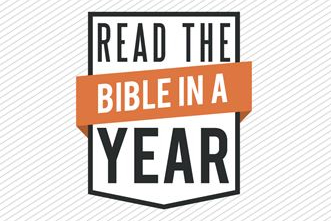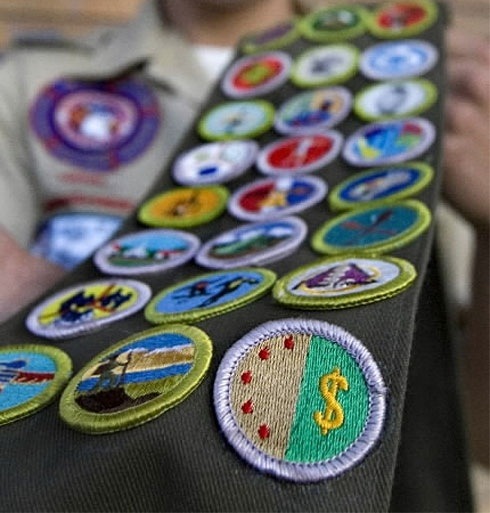in one year.
We all are familiar with those programs that provide a schedule to read the entire Bible in a single year. Often they are pitched as an antidote to biblical illiteracy. If people read it all, have the whole thing under their belt, then it will make sense and fall nicely into place. I don’t think so.
Usually the readers end up worn down, dejected, plodding to the end only because of a compulsive need for closure. There is typically too much to read beneficially in a single day. As with many of the best things in life, less is often more when it comes to reading scripture—a few verses, a paragraph, prayerfully pondered.
Worse yet, and what occasioned this blog, was a pastor colleague reporting that people started “losing their faith” as they slogged on.
You might think that sounds like a “teachable moment,” a wonderful opportunity to explain the beauty, balance, and complexities of the Bible. But we’re beyond that by now. So much blood and gore. Such an arbitrary and angry god. Such primitive and crude stories. How could they belong to a faith that finds guidance and life in these embarrassingly awful texts?
Similarly, I occasionally encounter the person determined to read the Bible from front to back, cover to cover, Genesis to Revelation. Although warned against it, they insist, motivated by some sort of obsession with order, because “this is how they read other books,” and maybe a need to show their obstinacy, to prove to be the exception to the rule. Like the read-the-Bible-in-one-year crowd, these folks have that merit-badge mentality, and a belief that if they can do this, then all the pieces of the Bible will finally fit. At long last, it will become clear. Despite their determination, they are stopped in their tracks somewhere in the latter Pentateuch.
We don’t have cable TV so I didn’t watch the recent series “The Bible” on the History Channel. But I’ve heard similar comments about it. When the stories just continue to unfold back-to-back, with no framework, no direction, no prioritizing, they all become of equal importance—or equally unimportant. In the end, it is only the memories of the especially violent and baffling events that rise above the blur to stay with the viewer.

Coming from a very different beginning place, but behaving similarly, are those folks with that burning desire to read the apocryphal books, or extra-canonical texts, especially if there is some faint whiff of scandal or forbidden fruit. Having read The Da Vinci Code ten years ago, these people are certain that the gnostics were: a.) correct, b.) more humane, c.) wronged by the Christians, d.) their true soul mates. Never mind that that their own understanding of Christianity is based on hit-and-miss attendance at Sunday School through the sixth grade. And let’s not forget those people eager and intent on reading the Koran or Upanishads, but would groan if invited to read the Letter to the Romans.
These things have an allure—reading the entire Bible is for the Marine Corps and P90X sorts. The Gospel of Thomas or the Upanishads for the literati. What would it mean to bring some allure to a more balanced and mature reading of scripture?
To be clear, go ahead and read 2 Chronicles and 2 Peter. Read Tobit (the Belgic Confession’s openness to the apocryphal books surprises many) and the Gospel of Thomas. Read the Koran and Upanishads. But if you’re a Christian, I suggest reading the four canonical gospels twenty times each, before you bother with Obadiah or 3 John. Read each of Paul’s letters fifteen times each, before you try to pull off reading through the Bible in one year.
We do have a canon in a canon. And we should. Some parts of the Bible are central, others peripheral. And some parts, while not peripheral, require seasoning and training to appreciate. Being deeply familiar with the Gospel of Luke, Galatians or Philippians will not make all the carnage and capriciousness in the Bible go away. But it will put them in a framework. It will move them from the foreground to the background.
Rather than a read-through-it-in-a year program, someone should take a stab at developing a prioritized biblical reading guide. Gospels, Psalms, Genesis, Exodus, Paul, Acts, Isaiah, would be at the top of my list. No Daniel until Year 13. And while I doubt anyone is willing to take on such an assignment—“fraught with controversy” might be an understatement—shouldn’t Christians at least be clear and open about such priorities and canons within the canon, even if we don’t use those terms?
To be sure, part of the wonder of scripture is the story of that traveling salesman who in a fit of desperation opens the Gideon’s Bible in his motel room and has his life turned-around by what he reads in Nahum. I’m not discounting that. But if you’re not desperate in a hotel room, I’d suggest reading 1 Corinthians, Ephesians, even James, fifteen times before you mess around with Nahum.

